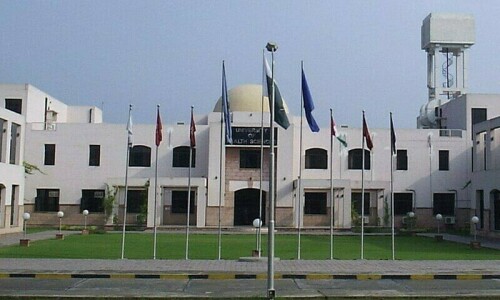LAHORE: Investigation into cases and prosecution with examples of high profile cases came under discussion on Friday at the kick-off of the Asma Jahangir Conference, being organised by the AGHS Legal Aid Cell at the Avari Hotel.
The first half of the event on Friday was called “Moving Closer to 2030 – SDGs, Gender Equality and the Justice Gap” with a panel of eminent speakers from England, including Baroness Helena Kennedy, Queen’s Counsel and Fellow of Royal Society of Arts, Director of International Bar Associations Human Rights Institute, one of Britain most distinguished lawyers, HHJ Khatoon Sapnara, Circuit Judge in England and Wales and authorised to act as a high court judge in England and Wales, Shona Jolly QC, chair of the Human Rights Committee and head of Cloisters Human Rights Practice Group and Barrister Zimran Samuel, human rights practitioner in children and international law. It included a discussion on place of women in the practice of law and the challenges for them in the criminal justice system.
The second half of the day had had a panel discussion on “Crimes against Women and the Criminal Justice System of Pakistan”.
The panel of speakers included Lahore High Court judge Shehram Sarwar, former Justice and prosecutor Syed Ehtisham Qadir Shah, Harris Azmat, advocate Supreme Court of Pakistan, advocate and legal expert Sara Malkani, along with Meenal Munshey from Beirut, Lebanon who moderated the event.
Women lawyers from all over the country flocked to listen to the sessions, especially the latter half. The women were members of the Bars in Tharparkar, Chitral, Swat, Bajaur, South Waziristan, Miran Shah, Peshawar, Swabi, Mardan, Mansehra, Dera Ismael Khan, Kohat, Jammu, Nowshera, Buner, Rahim Yar Khan, Bahawalpur, Bahawalnagar, Muzaffargarh, Multan, Vehari, Jacobabad, Shikarpur, Sukkur, Khairpur, Meerut and Khuzdar.
Advocate Nazia from KP said she had travelled a long way to come to the conference out of her admiration for the late Asma Jahangir who advocated peace, justice and equity. She said such events were integral for discussions that affect the common person’s every day issues pertaining to law and justice.
There were also several others from the legal community from Lahore, including judges.
Many members of the audience asked questions to clear some of the confusions that some cases had caused for them or about specific situations which would often occur.
Answering a question over the extent to which a child’s testimony was permissible, Mr Ehtishamuddin said that by law, the testimony was completely permissible, according to Article 3 of the Law of Witness (Qanoon-i-Shahadat). However, he added, the judge and court must not be aggressive or push the child to make his or her statement.
“The atmosphere of the court must be cordial. The judge should also verify if the child is giving all other basic information correctly.”
However, he recognized the child could also be emotionally traumatised if he/she had undergone something such as sex abuse or had witnessed something traumatic and therefore might not be in the right mind to give answers. For this, they agreed children should have a separate court.
He also spoke about the importance of the investigation and how it could affect the prosecution later. He gave the example of the Zainab case, saying how the presence of the DNA helped determine the decision of the court.
He added that unless the investigation officer (IO) was given the skills and training, he/she needed, the prosecution could never be solid enough.
Mr Shehram Sarwar spoke about other types of issues in criminal cases, and answering a question, he said when families ended up compromising with the accused party, the judge should at least verify and find out why the compromise had taken place.
“At the very least, the judge should certainly not push for any compromise if the petitioner or complainant does not go in that direction,” he said.
The day ended after a thorough interaction of women lawyers and other justice sector personnel.
Published in Dawn, October 19th, 2019












































Dear visitor, the comments section is undergoing an overhaul and will return soon.